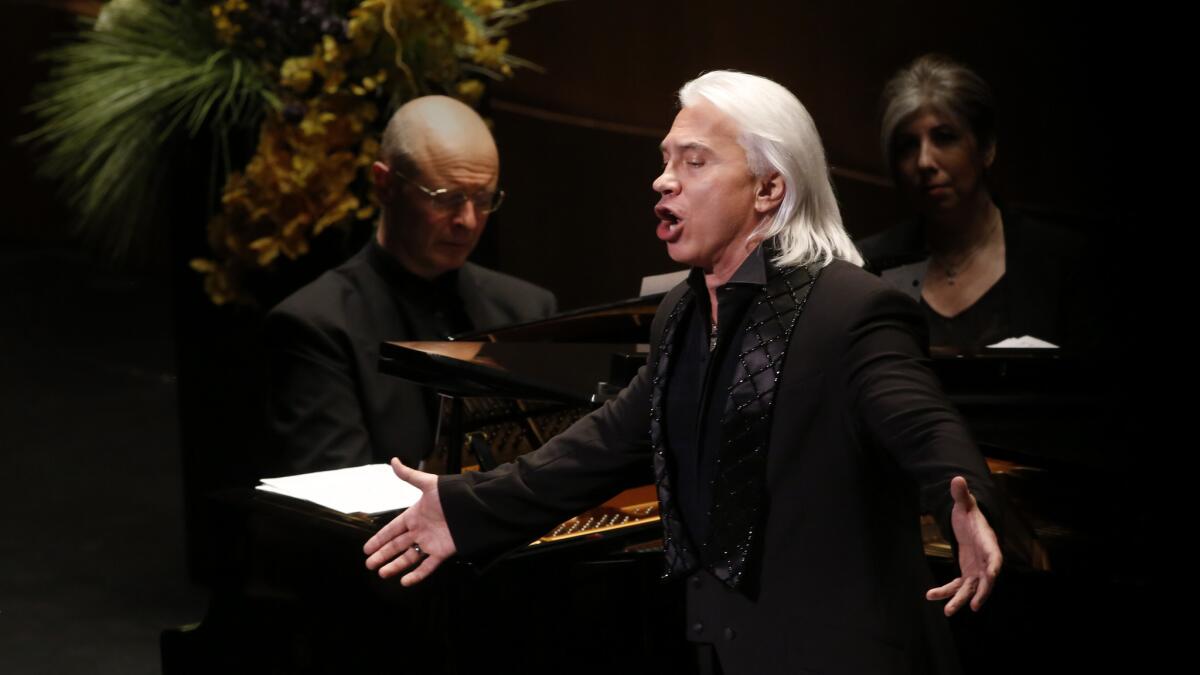Siberia’s bleak, beautiful baritone sweeps across L.A. Opera

- Share via
Dmitri Hvorostovsky is from Siberia. He knows from prisoners. He doesn’t take any.
The leonine Russian baritone’s recital at the Dorothy Chandler Pavilion on Thursday night presented by Los Angeles Opera dealt in desolation, loss and utter hopelessness. The sentiments were as drab as a Soviet winter.
The first half of the program was devoted to 19th and 20th century Russian songs, each one set to a Pushkin text, each one the voice of a long-suffering, inconsolable lover. After intermission came a rare performance of Shostakovich’s Suite on Verses by Michelangelo Buonarroti, an abysmally black song cycle by a sullen composer written while in hospital enduring the last stages of lung cancer.
It was magnificent — a mesmerizing recital by a supremely elegant and charismatic singer. It was also a supremely weird event.
Hvorostovsky came dressed not for despair but success. Early in his career, People magazine chose him as one of the 50 most beautiful people of 1991. With his long silver hair, he effuses glamour, but he also goes in for glitter. On this occasion he wore a dapper long coat with a long sparkly lapel. A sizable audience enthusiastically consumed and applauded each and every dismal song, the more pessimistic seemingly the better.
The evening began, though, with a laugh. As he walked on stage, Hvorostovsky spotted Renèe Fleming in the front row and gave a surprised, warm greeting to the soprano, who happens to be starring in L.A. Opera’s production of “A Streetcar Named Desire.” Throughout the recital, the baritone made small gestures to Fleming, clearly happy to be in the company of friends.
And by yet another weird coincidence, Hvorostovsky seemed to begin just where Andrè Previn’s opera leaves off. As Blanche DuBois, Fleming sings in the last act of “Streetcar,” “I Believe in Magic.” Hvorostovsky’s first Pushkin song was Glinka’s “I Remember that Magical Moment.” His second song was Glinka’s “My Blood Boils With Desire.”
The Pushkin set — which worked historically through Alexander Dargomyzhsky, Borodin, Rimsky-Korsakov, Cèsar Cui, Tchaikovsky, Nicolai Medtner, Rachmaninoff and Georgy Sviridov — offered 50-plus shades of melancholic gray, nearly as many ways a woman can leave her lover, why women are unreliable, why fountains of tears will thus spring eternal and why civilization is basically doomed.
The three Medtner songs were the most elaborate, the most atmospheric and the most colorfully textured. They also had the most effusively virtuosic piano accompaniments, played with a cool but distinctive flair by Estonian pianist Ivari Ilja. Sviridov’s “Drawing Near to Izhory” was the one number that dared draw near to irony and humor (black, of course), in part because of a playful piano accompaniment.
As for Hvorostovsky, he was stentorian. He started out as the quiet baritone with a marvelously refined voice. Now 51, he has developed more power and discovered thunder. He sounded slightly raw at first Thursday, as if forcing himself to project in a large hall. But soon enough, he found his focus, becoming impressively forceful. He may have seemed to take a tad too much satisfaction in relaying a soul in torment, but this is Russian music and, for Hvorostovsky, sorrow magnified is resplendent.
As for Shostakovich, that’s a different matter. The composer found 11 poems by Michelangelo, translated into Russian, that mirrored his alternate states of dying — denial, outrage, dejection, fear, acceptance. The musical style is minimal with likely fewer notes for the piano in 40 minutes of this late Shostakovich than in another composer’s three-minute Pushkin song. The vocal lines are bare, raw, disconcertingly exposed.
There is something unavoidably obnoxious about this song cycle, as if a self-centered composer had lost all inhibitions toward self-pity in his need to extract extreme sympathy. Michelangelo’s poems are made to be all about Shostakovich, who reflexively quotes his early music.
But there is also something brilliant about Shostakovich’s ability to project the sheer obnoxiousness of death. In the last poem, Michelangelo finds comfort in immortality, but Shostakovich, ever sarcastic, makes that come out as pure baloney.
Hvorostovsky sang these songs straight, without an obvious interpretive take on them. He did not sentimentalize. Nor was he despondent. He added no sugar, but Death was kept at bay by a honeyed voice.
An adoring audience could not, obviously, be sent home cheerless. For his first encore, the opera star finally turned to opera, and he brought tremendous menace to Iago’s “Credo” from Verdi’s “Otello.” He then crooned a romantic Italian song and finally intoned an a cappella Russian folk song. There is summer in Siberia too.
More to Read
The biggest entertainment stories
Get our big stories about Hollywood, film, television, music, arts, culture and more right in your inbox as soon as they publish.
You may occasionally receive promotional content from the Los Angeles Times.










